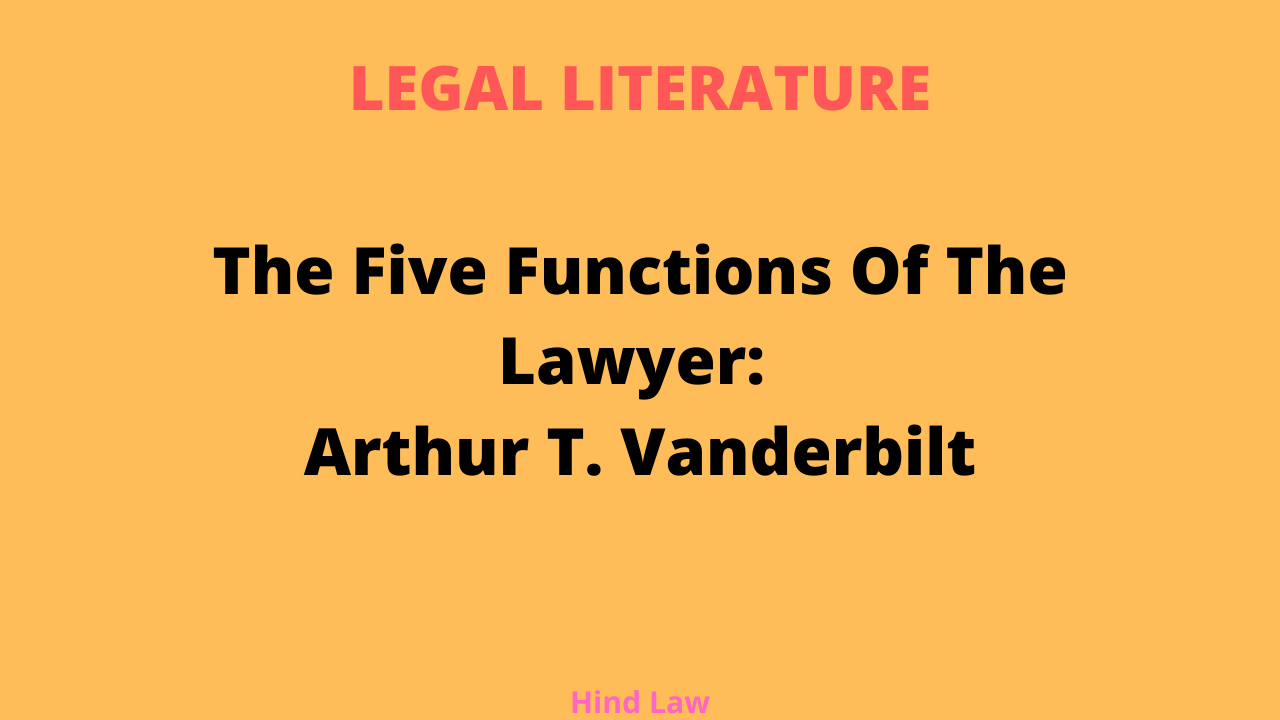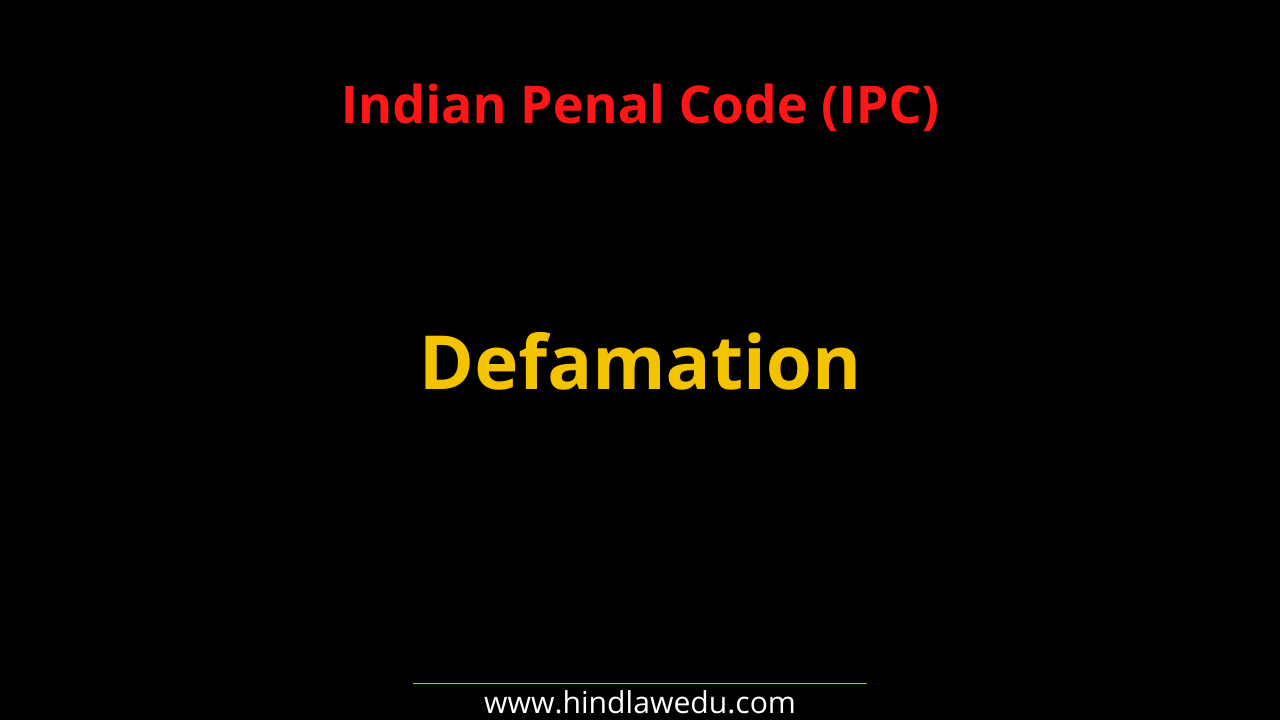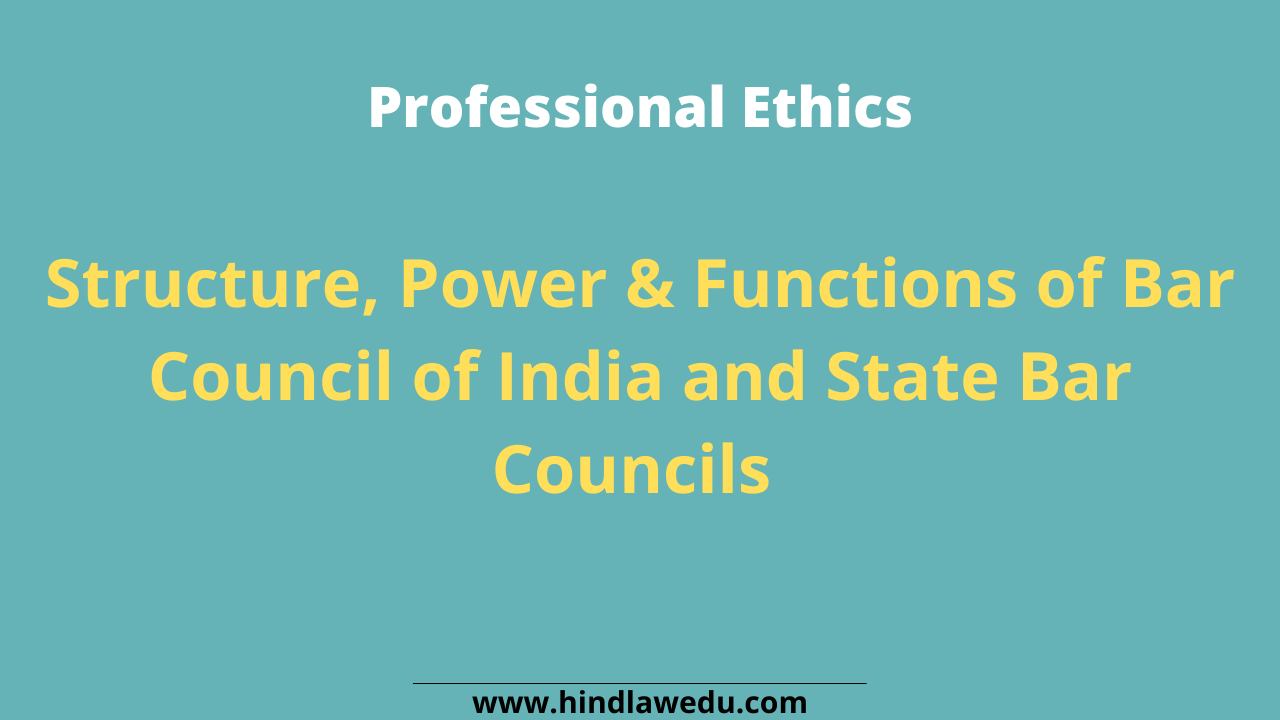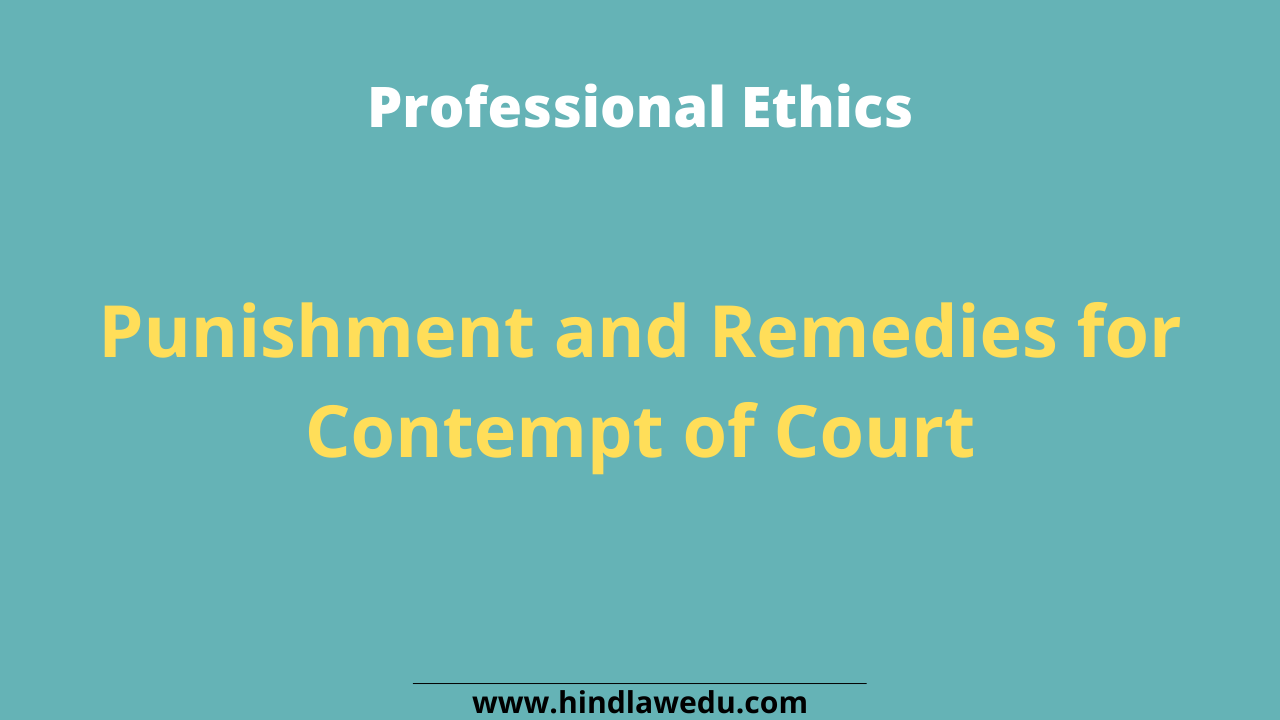Table of Contents
Introduction
Misconduct is the antonym of conduct. Conduct means behavior with good manners and treatment shown towards others. Misconduct represents misbehavior. Misconduct as explained in the Dictionary is ‘improper conduct’.
The term ‘misconduct’ has been defined in Black’s Dictionary as ‘a transgression of some established and defined rule of action, a forbidden act, a dereliction of duty, unlawful behavior, willful in character, improper or wrong behavior’. Its synonyms are misdemeanor, impropriety, mismanagement, offence, but not negligence or carelessness.
SURENDRA NATH MITTAL v. DAYA NAND SWAROOP (BCI Tr. Case No. 63/1987)
FACTS: In this case, the complaint was addressed to the Chief Justice of Allahabad High Court by Surendra Nath Mittal against Daya Nand Swaroop alleging that Daya Nand Swaroop and his father Bhagwat Swaroop filed a suit against the complainant for the recovery of certain amount for use and occupation of an accommodation in the tenancy of the complainant. Sri Bhagwat Swaroop died and his heirs were brought on record.
ISSUE: The suit was declared ex parte and a decree was drawn. Thereafter, Daya Nand Swaroop made interpolation in the judgment and decree by addition of the word “mai sood” (i.e., including interest) either in his own handwriting or otherwise caused to be added these two words. These words were added in the operative portion of the judgment and also in decree are in one and the same handwriting and it is not in the handwriting of the Presiding Officer or in the handwriting of the clerk concerned.
The respondent advocate denied the allegation and contended that he had not committed any offence.
HELD: The Disciplinary Committee found the advocate guilty. The Committee held that it was the respondent who had added the words subsequently and therefore he was guilty of getting manipulated or manipulation, the Court by record by adding the words “mai sood” in the judgment and decree.
The Committee ordered for his suspension for one year. The respondent was ordered to pay a cost of Rs. 3,000 to the complainant and in case he failed to pay the cost within two months, he would undergo suspension for an additional period of one year. The cost was to be deposited in the Bar Council of India to be remitted to the complainant within a period of two months from the date of receipt of the judgment.
SMT. FARIDA CHAUDHARY v. DR. ACHYUT KUMAR THAKURIA (BCI Tr. Case No. 1/1998)
It is a case transferred to the Bar Council of India from the Bar Council of Assam. The complainant was an employee of Steel Authority of India, Guwahati. She was residing at Guwahati. The respondent was her neighbor. The respondent advocate filed false cases against her and also wrote a letter to her employers to harm her reputation in her department. In addition, he wrote letters to the complainant containing obscene and vulgar language with remarks, sketches and pictures in his own handwriting.
The Committee held that the respondent advocate was exceeding his power to write to an employer regarding the conduct of a person. The respondent has written the letter on 8-10-1990 to the employer of the complainant that the complainant was accused in police station case no. 291/90 under sections 504 and 506 of the Indian Penal Code and she surrendered to the Chief Judicial Magistrate, Guwahati on 22-9-1990. The letter was written on 8-10-1990 while the date of hearing of the case against the complainant was fixed on 9-10-1990 and on this date the complainant and her husband were discharged. The respondent was held liable for writing this letter.
Besides, he was found to be the author of the obscene letters. The conduct of the respondent advocate was unbecoming of the lawyer. He had, thus had and rendered himself liable to the disciplinary action of punitive nature. He had failed to discharge his duties as a responsible person of the society. The respondent advocate was held guilty of professional misconduct.
He was suspended by the Committee from practice for a period of four months. The Committee imposed a cost of 10,000 rupees over him to be paid to the complainant and in case of failure in payment within two months; he was to undergo suspension from practice for an additional period of one year. As per order of the Committee the cost was to be deposited by the respondent advocate with the Bar Council of Assam under intimation to the Bar Council of India so that the amount could be collected by the complainant at Guwahati.
PRATAP NARAIN v. Y.P.RAHEJA (BCI Tr. Case No. 40/1993)
FACTS & ISSUE: In this case, Shri Pratap Narain filed a complaint before Delhi Bar Council against Shri Y.P. Raheja, advocate. The respondent was an advocate acting for the complainant in a case. It was alleged that respondent handed over him a forged stay order while no stay order was passed by the Court in the case. After examining all the evidence and relevant facts the Disciplinary Committee of the BCI came to the conclusion that the respondent advocate himself handed over him the forged stay order which was not passed by the Court. The respondent advocate pleaded that the forged stay order was handed over to the complainant by his clerk.
The Committee opined that if the clerk had done so it was his duty to inform regarding the same. However, the Committee came to the conclusion that the respondent himself handed over the forged stay order to the complainant and held him guilty of handling over the forged stay order which was not passed by the Court. The complainant was made to believe that the said order was passed by the Court and he came to know the fraud played upon him through another advocate engaged by him.
The respondent had admitted that he gave assurance to the complainant that “he will see to it that nothing happens to him in the police station”. The Committee held that from the assurance made by the respondent in his reply, it was clear that he was responsible for handing over the forged stay order to the complainant.
HELD: The Committee after examining the facts, evidence, etc., held that the respondent was guilty of professional misconduct of serious nature. He has forged the order of the Court. Consequently, the Disciplinary Committee ordered removal of his name from the roll maintained by the Bar Council of Delhi. The Committee made it clear that no lesser than the aforesaid punishment could be imposed as the professional misconduct was of a serious nature.
VIKRAMADITYA v. SMT. JAMILA KHATOON (D.C. Appeal No.21/1996)
It is an appeal against the decision of the Disciplinary Committee the U.P. Bar Council. By the said order of the Disciplinary Committee of the Bar Council of U.P. suspended the advocate for a period of five years. The Disciplinary Committee of the Bar Council of India dismissed the appeal and held the said order right, although it opined that more severe punishment could be imposed.
The appellant advocate got the signature of the complainant on the blank vakalatnama and blanked watermarked papers. The complainant handed over to him, his counsel, the original sale-deed for mutation. The appellant did not file the mutation suit. He filed a suit on behalf of his father, Mr. Jhoolan Yadav against Smt. Jamila Khatoon for the declaration of the aforesaid sale deed in the favor of Smt. Jamila Khatoon benami transaction and the real owner was his father, Jhoolan Yadav. He misused the vakalatnama and blank paper signed by the complainant and filed a compromise and obtained a compromise decree in favor of his father. The original sale-deed handed over to him by the complainant was also misused.
The Disciplinary Committee found that the appellant advocate was acting as an advocate of the complainant from an earlier point of view. It was found that he was the counsel, in the preparation and execution of the sale-deed in the favor of the complainant which was executed by Shri Ram Dhani, the owner of the land. It was found that the stamp paper for the aforesaid sale-deed was purchased through the appellant advocate. Consequently, the statement of the appellant advocate that he was not involved in the sale-deed was found by the Disciplinary Committee totally incorrect.
HELD: The Disciplinary Committee held that Jamila Khatoon, handed over the blank papers and vakalatnama for the purpose of mutation and later on these documents were misutilised for getting the land transferred in the favor of his own father. This was a serious misconduct. The complainant’s illiteracy was exploited and she was defrauded by the appellant advocate.
Thus, the Disciplinary Committee of the BCI held that the appellant advocate was guilty of professional misconduct of serious nature and he was rightly punished by the Disciplinary Committee of the Bar Council of U.P. by suspension from practice for a period of five years, though more serious punishment could be imposed upon him.
S.K. NAGAR v. V.P. JAIN (D.C. Appeal No. 14/1997)
This is an appeal to the BCI against the decision of the Bar Council of Rajasthan. The complainant had alleged that he had engaged Shri S.K.Nagar, an advocate to file a complaint against certain persons for restoration of possession of the room and articles lying therein. They were in occupation of the room as tenants in the house of the complainant situated at Jawahar Nagar.
Requisite fees were paid to the respondent who gave the complainant assurance that the case was being processed and the aforesaid persons had expressed their willingness to hand over the possession of the house and needed some time for it that nothing emerged and the respondent informed him that the said persons had not appeared in the Court and had not delivered vacant possession ordered by the Court.
He further informed the complainant that a warrant of arrest has been issued by the Court and he charged Rs 500 for the expenses. The respondent told the complainant that a warrant of attachment had been ordered by the Court against the aforesaid persons and got 1000 rupees from the complainant for depositing in Court for issue of warrant. The respondent also informed him of the date of hearing.
HELD: The respondent advocate, thus gave false information and prepared false and fabricated documents to convince client about pendency of case while no case was filed in the Court. He was thus held guilty of professional misconduct. The Disciplinary Committee of the Bar Council of Rajasthan imposed a punishment of two years of suspension from practice. The Disciplinary Committee of BCI in appeal, enhanced the punishment.
Babul al Jain v. Subhash Jain
The complainant was an advocate. He alleged that the respondent advocate was practicing lawyer as well as was working as an editor, printer and publisher of a weekly called “Aj ki Janta.” Three charges were framed against him.
First, at the time of his registration as advocate he did not disclose that he was owner, publisher, printer and editor of a weekly.
Second,even after registration as an advocate he used to work as publisher, printer and editor of the aforesaid weekly.
Third, the charge against him was that he was personally engaged in other business.
The disciplinary committee of the BCI held that the first charge was found to have been proved and it would take an action under section 26 of the Advocates act for removing his name from roll under 35 of the said Act. As regards the second charge as publisher only for legal publication or even for knowing legal publication.
As per Rule 51 of the BCI, an advocate may review parliamentary bills for a remuneration, edit legal text books at a salary, do press-vetting for newspapers coach pupils for legal examination, set and examine question papers and subject to the Rules against advertising and full time employment engage in broadcasting journalism lecturing and teaching subjects, both legal and non-legal.
The committee has observed that by journalism what is meant is either writing for newspapers or editing for such newspapers. It does not include printing and publishing of the newspaper which is a business itself. Printing and Publishing of the weekly was taken as breach of the Rules of the BCI.
The disciplinary committee held him guilty of professional misconduct under section 35 of the Advocates Act and the respondent advocate was suspended from practice for the period of one year.
Shambhu Ram Yadav v. Hanuman Das Khatry,
In this case the SC made clear that writing a letter to his client to send money to bribe the judge is a serious misconduct.
In this case a complaint was filed by the appellant against respondent-advocate before the Bar Council of Rajasthan was referred to the disciplinary committee constituted by the State Bar Council. The complaint was that the respondent while appearing as a counsel in a suit pending in a civil court wrote a letter to Mahant Rajgiri that the concerned judge accepts a bribe and if he sends money the order will be in his favour.
The state bar council after looking at all the aspects came to the conclusion that the respondent was guilty of professional misconduct and suspended him from practice for a period of two years. The respondent challenged his order before the disciplinary committee of BCI. The committee enhanced the punishment and directed that the name of respondent be struck off from the Roll of advocates and thus debarring him permanently from practice
After that respondent filed a review petition and the court held that the earlier order had taken into consideration and considering the nature of misconduct, penalty of permanent debarment had been imposed on the respondent which, without any valid ground, has been modified in exercise of power of review. It is the duty of the Bar councils to ensure that the lawyers adhere to the required standards and on failure, to take appropriate action against them. Of course, the punishment has to be commensurate with the gravity of the misconduct.
The passed in review was set aside and the original order of the Disciplinary Committee of the Bar Council of India was restored.
In the case of J.N. Gupta v. D.C. Singhania & J.K. Gupta
The respondent advocates had issued two advertisements in a newspaper; the first indicating a change of address on account of fire in the building where they were practicing, and the second time for shifting back to the building where their old office was located.
Subsequently, they also published their name and address in the International Bar Directory under the headings “Singhania & Company”, “Firms Major Cases” and “Representative Clients”.
The Court held that there was no violation of the rule against advertisement with respect to publication in the newspaper as the same was made on account of the fire, which required urgent notice of change in address to be given to existing clients.
With regard to the publication in the International Bar Directory, it was held that publication in any manner, either in National or International Bar Directory would not constitute a violation of Rule 36 if it is done with the purpose of giving information of address or telephone numbers of advocates.
However, in the instant case, it was found that the publication was made to give publicity to the fact that the law firm had dealt with important cases and had eminent clients. Hence, was being used to advertise the firm itself.
Conclusion
The advocates play a significant role in the judicial system. One relies on them completely by setting their complete trust. It is important for an advocate to discharge its responsibilities in a precise and efficient manner. Being in the legal profession and an officer of the court, an advocate is required to maintain high standards and uphold the dignity of the judicial office. Any misconduct of an advocate shall not be tolerable as this shall affect the trust and attitude of the people towards the judicial environment.
In order to ensure that such irresponsible and irrational behavior does not go unpunished a disciplinary committee has been set up and given powers to conduct such matters involving fraud, misconduct and cheating committed by an advocate towards his own client and others. In the last ten years, the Bar Councils have had an onerous(heavy) task to perform. The members of the legal profession and the public look forward to the Bar Councils for the discharge of their functions and obligations so that justice can be served to all.
Also Read:
Defences against Civil and Criminal Contempt
Structure, Power and Functions of State Bar Council and Bar Council of India
Professional And Other Miscondu














